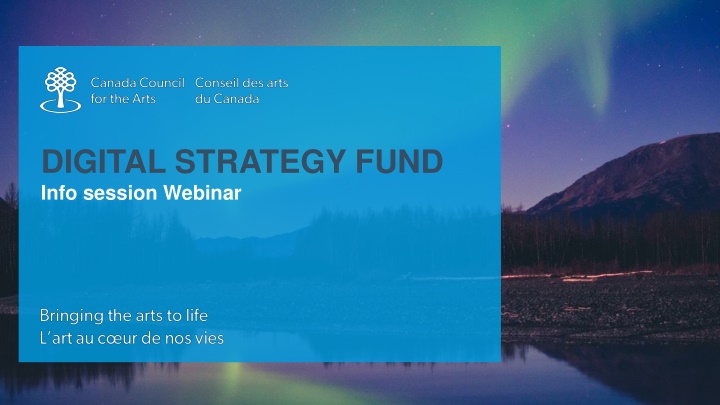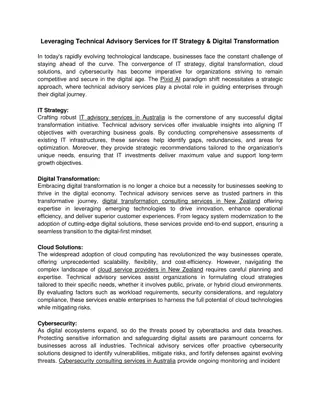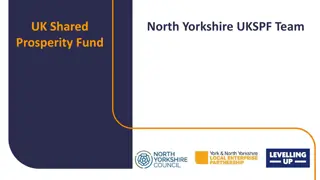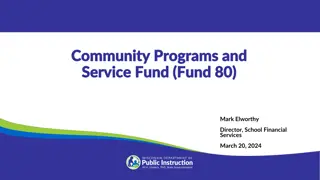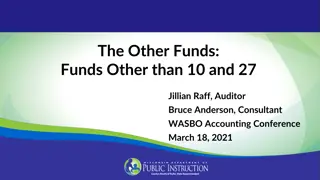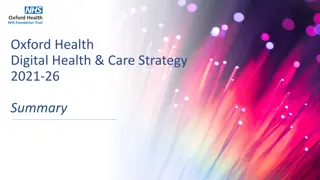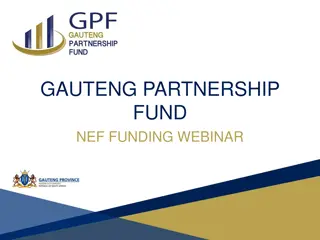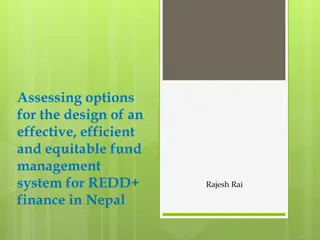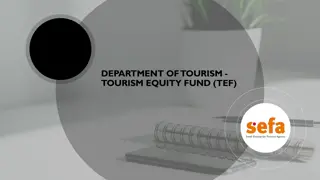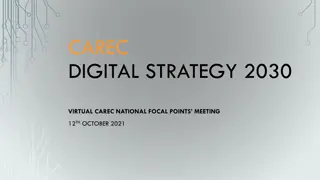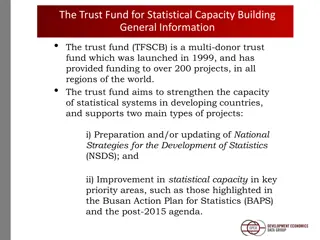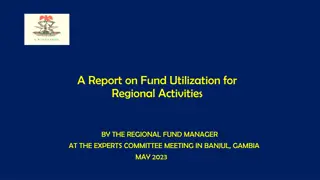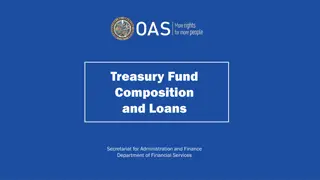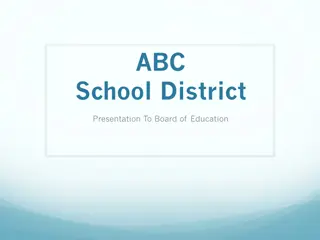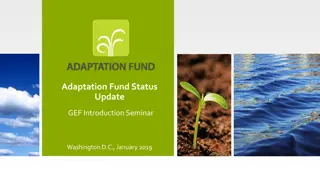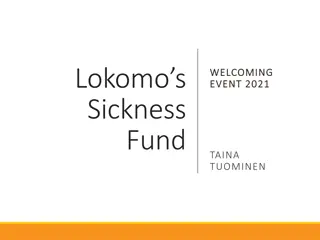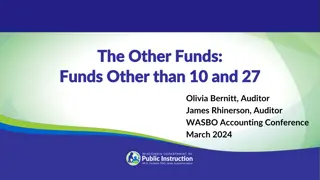Digital Strategy Fund Information Session Overview
The Digital Strategy Fund (DSF) aims to support the digital transformation of the arts sector by enhancing digital knowledge, capacity, and citizen engagement. This session covers the purpose of the DSF, eligibility criteria, components, and activities supported. Professional artists, arts professionals, art groups, and Canadian arts organizations can apply. Non-eligible applicants include consultants, non-Canadian organizations, and new or aspiring artists. The three components of DSF focus on digital literacy, public access to the arts, and organizational transformation. Eligible activities include training, workshops, hackathons, and more to strengthen digital skills and strategic thinking in the arts sector.
Download Presentation

Please find below an Image/Link to download the presentation.
The content on the website is provided AS IS for your information and personal use only. It may not be sold, licensed, or shared on other websites without obtaining consent from the author.If you encounter any issues during the download, it is possible that the publisher has removed the file from their server.
You are allowed to download the files provided on this website for personal or commercial use, subject to the condition that they are used lawfully. All files are the property of their respective owners.
The content on the website is provided AS IS for your information and personal use only. It may not be sold, licensed, or shared on other websites without obtaining consent from the author.
E N D
Presentation Transcript
DIGITAL STRATEGY FUND Info session Webinar
What we will cover: What is the purpose of the Digital Strategy Fund (DSF)? Who can apply to DSF? What are the 3 components? What can I apply for? When are the deadlines? Where can I learn more? 2
The Digital Strategy Fund and its purpose To stimulate the digital transformation of the arts sector, and to support strategic collaborative initiatives that: Build strategic digital knowledge and capacity Increase discoverability of the arts through digital technologies transform the digital experience of citizens with the arts Enable digital transformation within the arts sector at the operational level 3
Who can apply? Applicants must have a validated Canada Council profile, and be one of the following: professional artists; arts professionals; artistic groups; Canadian arts organizations. 4
Who can apply? The following are not eligible to apply as a lead applicant: Consultants and third-party service providers; Non-Canadian arts organizations; New and Early Career Artists profile; Aspiring Artists profiles. However they can still collaborate with an eligible lead applicant as partners or service providers. 5
The 3 DSF components 1. Digital Literacy and Intelligence 2. Public Access to the Arts and Citizen Engagement 3. Transformation of Organizational Models 6
1. Digital Literacy and Intelligence Supports the arts sector in building digital knowledge, skills and capacity to: respond more effectively to digital challenges, issues and opportunities; develop and broaden their strategic digital thinking; strengthen their ability to translate that thinking into sustainable, concrete actions. 7
1. Digital Literacy and Intelligence Eligible activities include: Build strategic digital knowledge and capacity; Group training, workshops, webinars, hackathons, digital strategic plans, etc. Gather and connect with people within or beyond the arts sector; Organizing symposia, forums, conferences, etc. Research and experiment with digital technologies and innovative approaches to problem solving. Design thinking, coaching approaches, conducting studies and strategic foresight, etc. 8
2. Public Access to the Arts and Citizen Engagement Supports the sector in finding ways to improve the public s access, engagement and participation in the arts through digital means that: enhance the artistic experience of diverse publics; encourage the participation and engagement of citizens with the arts; increase discoverability and access to the works of Canadian artists, both at home and abroad. 9
2. Public Access to the Arts and Citizen Engagement Eligible activities include: Develop and explore innovative solutions to digital challenges; Consulting and developing solutions with citizens, testing new ideas as a minimal viable product, piloting projects amongst communities, user-centric design, etc. Implement new initiatives to improve digital discoverability and access to the arts Metadata initiatives, open and linked data, freeware development, digital engagement platforms or tools, etc. Reinforce, optimize, or scale up existing digital initiatives 10
3. Transformation of Organizational Models Support for artists and arts organizations to transform the way they work in order to address challenges, seize opportunities and adapt to a networked and connected environment. 11
3. Transformation of Organizational Models Eligible activities include: Develop and explore digital solutions to challenges related to workflows and organizational models; Digital business analysis, consultation and development with other organizations, testing new ideas as a minimal viable product, piloting projects, etc. Implement new digital initiatives that transform how arts organizations operate; Enabling data interoperability, open and linked data models, sector business intelligence, data governance strategies, decentralized, cloud-based and mobile frameworks, etc. Reinforce, optimize, or scale up existing digital initiatives. 12
Remember: 3 DSF components To stimulate the digital transformation of the arts sector, and to support strategic collaborative initiatives 1. 2. 3. Digital Literacy and Intelligence Public Access to the Arts and Citizen Engagement Transformation of Organizational Models 13
Ineligible activities Initiatives to research, create, produce or program artistic work or creations. Activities conducted for the development of artistic skills. Activities conducted for the benefit of a single organization, an artist, group or collective. Recurring or ongoing activities, such as social media management or day-to-day operations. 14
Ineligible activities contd Creating or updating personal, corporate or institutional websites. Updating current computer or technological equipment and hardware infrastructure. Initiatives where the final goal is to digitize documents, collections or archives. Activities that have already received Canada Council support. Hiring permanent staff. 15
Assessment Criteria If eligible, your application will be assessed by a committee based on the weighted criteria, in a competitive context. Impact - 50% Relevance - 30% Feasibility - 20% Applications requesting up to $50,000 will be assessed by an internal or an external committee. 16
Deadlines and when to apply Requests of $50,001 to $500,000 Annual deadline September 2020 (date TBD) Results in March 2021 Requests under $50,000 Open deadline all 3 components Submit any time before the start of your activities Results generally within 3 months of submission No limitations, applications do not count into annual limit 17
To learn more Resources available - DSF webpage on CCA website: canadacouncil.ca/funding/strategic-funds/digital-strategy-fund Read the guidelines relative to each component See the list of successful applications from past competitions Read a selection of blog post articles Contact us at digitalstrategyfund@canadacouncil.ca Describe briefly the initiative Include an outline of main activities Write down a shortlist of questions 18
Thank you! canadacouncil.ca | conseildesarts.ca
